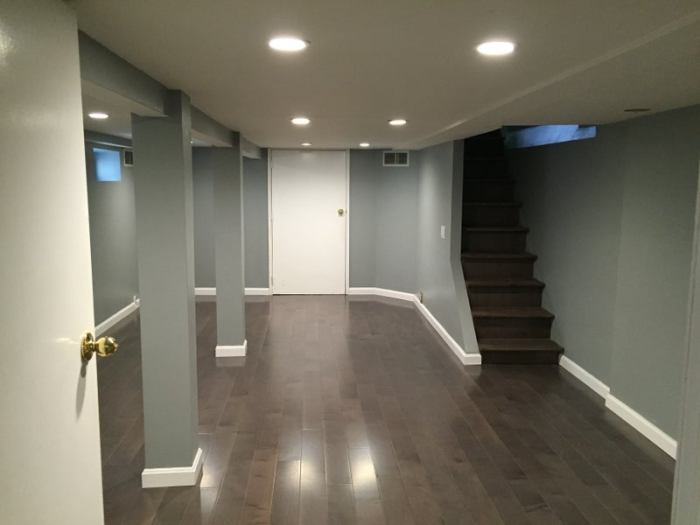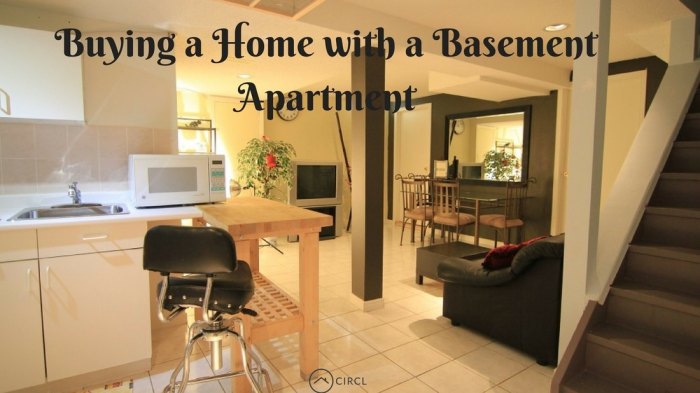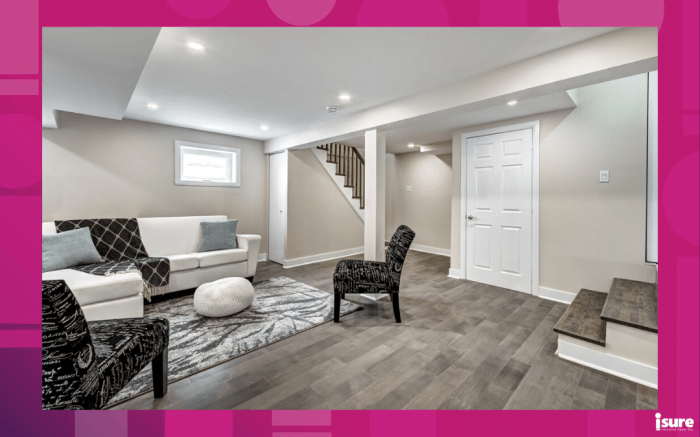Legal and Regulatory Aspects of Renting a Basement Apartment
Rent basement in house – Renting a basement apartment involves navigating a complex legal landscape. Understanding local regulations and landlord-tenant laws is crucial for both landlords and tenants to ensure a smooth and legally sound rental agreement. Failure to comply with these regulations can lead to legal disputes and financial penalties.
Permitting and Licensing Requirements
Securing the necessary permits and licenses for renting a basement apartment varies significantly depending on location. Some jurisdictions require separate permits for dwelling units within a single-family home, while others may have stricter building codes and occupancy limits for basement apartments. Landlords should contact their local building department or zoning office to determine the specific requirements for their area.
This may include obtaining a certificate of occupancy, a rental license, and possibly meeting specific safety and health standards. Failure to obtain the necessary permits can result in fines or legal action.
Landlord-Tenant Laws and Lease Agreements
Landlord-tenant laws govern the relationship between landlords and tenants. These laws define the rights and responsibilities of both parties, including lease terms, rent payments, repairs, and eviction procedures. A comprehensive lease agreement is essential, explicitly outlining the terms of the rental agreement, including details specific to basement apartments such as access to utilities, shared spaces, and emergency exits.
State and local laws will dictate the specifics of the lease, including clauses related to repairs, maintenance, and notice periods. It’s advisable for landlords to consult with legal counsel to ensure their lease agreement is compliant with all applicable laws.
Insurance Requirements
Landlords renting basement apartments face different insurance considerations compared to those renting entire houses. Standard homeowner’s insurance may not adequately cover the liability associated with renting a separate unit. Landlords may need supplemental liability insurance to protect themselves against potential claims related to accidents, injuries, or property damage within the basement apartment. The level of coverage required depends on factors like the number of tenants, the condition of the apartment, and local regulations.
Comparing quotes from different insurance providers is recommended to find the most suitable and cost-effective coverage. A sample lease agreement should include a clause outlining the tenant’s responsibility for renter’s insurance.
Sample Lease Agreement Clause for Basement Apartments
This lease agreement, effective [Start Date] between [Landlord Name] and [Tenant Name], specifically addresses the unique aspects of renting the basement apartment located at [Address]. The tenant acknowledges and agrees to the following: (a) Shared use of [List shared amenities, e.g., laundry, backyard]; (b) Independent access to the basement apartment via [Describe access point]; (c) Responsibility for maintaining cleanliness and order within their rented space; (d) Compliance with all building codes and safety regulations; (e) Notification to the landlord of any repairs or maintenance needs within 24 hours.
Safety and Security Considerations for Basement Apartments

Source: spareroom.com
Basement apartments present unique safety and security challenges compared to above-ground units. Addressing these concerns is paramount to ensuring the well-being and peace of mind of tenants. Neglecting these aspects can lead to accidents, property damage, and legal liabilities for the landlord.
Potential Safety Hazards
Basement apartments are more susceptible to issues like mold growth due to moisture and poor ventilation. Dampness can also lead to structural damage and respiratory problems for tenants. Inadequate egress, or escape routes, poses a significant fire hazard. Other potential hazards include poor lighting, lack of smoke detectors, and the presence of carbon monoxide. Landlords must address these concerns proactively.
Safety and Security Improvements
Implementing effective safety and security measures is crucial. This includes installing and maintaining functioning smoke and carbon monoxide detectors, ensuring adequate lighting, providing clear emergency exit routes, and potentially installing security systems like alarm systems or security cameras. Regular inspections are vital to identify and address any potential hazards before they escalate. Proper insulation can help mitigate dampness and temperature fluctuations, improving both comfort and safety.
Emergency Exit Plans
Clear and accessible emergency exit plans are non-negotiable. Tenants should be familiar with multiple escape routes, including windows and doors, and the location of fire extinguishers. Regular fire drills can reinforce the importance of these plans and ensure tenants know how to react in an emergency. The landlord should provide a written emergency plan and conduct regular safety checks.
Landlord’s Safety and Security Checklist, Rent basement in house
- Smoke and carbon monoxide detectors (tested regularly)
- Working emergency lighting
- Clear and accessible emergency exits
- Proper ventilation system
- Regular inspections for mold and water damage
- Security system (optional, but recommended)
- Exterior lighting
Marketing and Advertising Basement Apartments for Rent
Effectively marketing a basement apartment requires highlighting its unique advantages while addressing potential concerns. A well-crafted advertisement can attract suitable tenants and ensure a quick and successful rental process.
Strategies for Attracting Tenants
Emphasize the positive aspects, such as privacy, affordability, and potentially desirable features like a private entrance or a finished space. High-quality photos and videos showcasing the apartment’s features are crucial. Target your marketing efforts towards the demographics most likely to be interested in a basement apartment, such as students, young professionals, or individuals seeking cost-effective living arrangements.
Sample Advertisement
Charming Basement Apartment – Private Entrance, Newly Renovated! Enjoy a cozy and private basement apartment in a quiet neighborhood. Features include a modern kitchen, updated bathroom, and ample storage space. Utilities included. Rent: $[Rent Amount]. Contact [Contact Information].
Advertising Platforms
Utilize a mix of online and offline platforms. Online options include Craigslist, Zillow, Apartments.com, and social media platforms. Offline options might include local newspapers or community bulletin boards. Consider the reach and cost-effectiveness of each platform when making your selection.
Compelling Apartment Description

Source: weebly.com
This newly renovated basement apartment offers a surprisingly spacious and bright living area, complete with large windows providing ample natural light. The modern kitchen boasts stainless steel appliances, and the bathroom features updated fixtures. Private laundry facilities are included, and ample storage space is available throughout the unit. The private entrance ensures peace and quiet.
Financial Aspects of Renting a Basement Apartment: Rent Basement In House
Managing the financial aspects of renting a basement apartment requires careful planning and record-keeping. Understanding all associated costs and implementing effective strategies for managing income and expenses are essential for profitability and financial stability.
Cost Breakdown
Costs include utilities (electricity, water, gas), property taxes, insurance, maintenance and repairs, and potential mortgage payments if applicable. Factor in the cost of advertising, tenant screening, and any necessary renovations or improvements.
Renting a basement apartment offers a unique living experience, often more affordable than other options. If you’re considering a longer-term commitment and exploring different ownership possibilities, you might want to investigate programs like those offered by housing rent own schemes. Understanding these options can help you decide if renting a basement is the right short-term solution before potentially purchasing your own home.
Ultimately, the choice depends on your individual financial goals and lifestyle preferences.
Determining a Fair Rental Price

Source: isure.ca
Research comparable rentals in the area to establish a competitive yet profitable rental price. Consider the size, features, and condition of the basement apartment when determining a fair market value. Consult with real estate professionals or use online rental price calculators for guidance.
Managing Rental Income and Expenses
Use a dedicated bank account for rental income and expenses to track cash flow effectively. Maintain meticulous records of all income and expenses. Consider using accounting software to simplify the process.
Budget Template
| Income | Expenses | Profit/Loss | Notes |
|---|---|---|---|
| Rent: $[Rent Amount] | Utilities: $[Utility Cost] | $[Profit/Loss] | [Notes] |
| Repairs: $[Repair Cost] | [Notes] | ||
| Taxes: $[Tax Cost] | [Notes] | ||
| Insurance: $[Insurance Cost] | [Notes] | ||
| Total Income: $[Total Income] | Total Expenses: $[Total Expenses] | Total Profit/Loss: $[Total Profit/Loss] |
Tenant Relations and Management for Basement Apartments
Maintaining positive relationships with tenants is crucial for a successful rental experience. Effective communication and clear procedures for handling issues are essential for minimizing conflicts and ensuring tenant satisfaction.
Communication Strategies
Establish clear communication channels, such as email or text messaging, for prompt responses to tenant inquiries and concerns. Be respectful, responsive, and professional in all interactions. Regular communication can prevent misunderstandings and foster a positive landlord-tenant relationship.
Handling Complaints and Disputes
Address tenant complaints promptly and fairly. Document all communication and agreements in writing. If disputes arise, consider mediation or arbitration to resolve the issue amicably. Understand local tenant laws regarding dispute resolution.
Property Inspections
Conduct regular property inspections to identify and address any maintenance needs before they become major problems. Provide sufficient notice to the tenant before each inspection. Document the inspection findings in writing.
Rent Collection and Late Payments
Establish a clear rent payment system, such as online payments or mailed checks. Implement a late payment policy, clearly Artikeld in the lease agreement, to ensure timely rent collection. Consider offering incentives for on-time payments.
Improving the Appeal of a Basement Apartment
Transforming a basement into an attractive and livable space requires careful planning and execution. Strategic design choices and improvements can significantly enhance the appeal and rental value of the apartment.
Enhancing Comfort and Livability
Prioritize proper lighting, ventilation, and insulation to create a comfortable and inviting atmosphere. Adequate lighting is essential for brightening the space and creating a welcoming feel. A good ventilation system will help prevent moisture buildup and mold growth. Insulation will improve temperature regulation and energy efficiency.
Maximizing Space and Appeal
Clever use of space-saving furniture, mirrors, and light colors can create the illusion of more space. Built-in storage solutions can maximize storage capacity without cluttering the space. Consider using multi-functional furniture pieces to save space.
Effective Interior Design Elements
- Recessed lighting
- Light and airy color palettes
- Large mirrors to reflect light
- Built-in shelving and storage
- Area rugs to define spaces
Visually Appealing Description
This stunning basement apartment has been meticulously renovated to create a bright, modern, and comfortable living space. The open-plan layout maximizes space, while large windows flood the apartment with natural light. The stylish kitchen and updated bathroom are highlights, offering modern convenience and luxury. The private entrance adds to the feeling of independence and privacy. The ample storage space and attention to detail make this apartment truly exceptional.
Detailed FAQs
What type of insurance is necessary for renting a basement apartment?
Landlords should consult with an insurance professional to determine the appropriate coverage, but generally, a landlord insurance policy with liability coverage is essential. The specifics depend on local laws and the specifics of the lease agreement.
How do I handle disagreements with a basement tenant?
Establish clear communication channels and address issues promptly and fairly. Review the lease agreement and local tenant laws. Mediation may be a helpful option before pursuing legal action.
What are some common issues with basement apartments that might deter renters?
Potential issues include lack of natural light, dampness, inadequate ventilation, and limited storage space. Addressing these proactively can significantly improve the appeal of the space.
Can I legally rent a basement apartment without obtaining permits?
No. Renting a basement apartment typically requires permits and adherence to local building codes and zoning regulations. Failure to comply can result in penalties.
